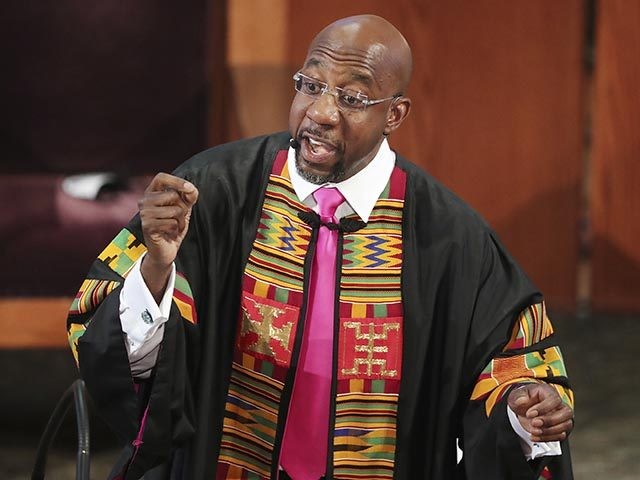Revealed: Raphael Warnock’s Radical History

Georgia Democrat Senate candidate Rev. Raphael Warnock’s past writings espouse Marxist views and include an abundance of racially charged language, a revelation that comes after Warnock evaded a debate question Sunday on whether he rejects Marxism.
Warnock, the senior pastor at Ebenezer Baptist Church who is seeking to unseat Republican Sen. Kelly Loeffler in the Georgia Senate runoff race, has come under fire amid his Senate bid for his past sermons, speeches, and writings. Two written works in particular reveal Warnock’s interest in Marxism, a philosophy named for Communist Manifesto author Karl Marx that has been employed by oppressive governments such as those of China and the Soviet Union.
In his 2014 book, The Divided Mind of the Black Church: Theology, Piety, and Public Witness, Warnock praised Marxism as a way to “teach the black church” and criticized Gary Marx, whom Warnock described as “a scholar who operates from within the theoretical framework of his famous namesake,” for trivializing “black struggle against the obduracy of white capitalistic forces.”
An excerpt from The Divided Mind is below:
To be sure, the Marxist critique has much to teach the black church. Indeed, it has played an important role in the maturation of black theology as an intellectual discipline, deepened black theology’s apprehension of the interconnectivity of racial and class oppression and provided critical tools for a black church that has yet to awaken to a substantive third world consciousness. Yet, Gary Marx’s analysis is flawed by a paternalistic bias with respect to faith, culture and experience that trivializes black struggle against the obduracy of white capitalistic forces and lumps all forms of black denominational and sectarian identity together in an undifferentiated way that hardly makes it possible for those who are its subjects to see themselves in the discussion. [emphasis added]
Warnock has been described as “radical” by his critics in part for his writings. Loeffler repeatedly identified Warnock as such during Sunday’s debate and asked Warnock pointblank, “Can you here and now for all Georgians renounce socialism and Marxism?” Warnock would not do so.
As Breitbart News reported, Warnock has also described Dr. James Cone, who repeatedly defended Marxism and used provocative anti-white language, as his “mentor.” Cone served as Warnock’s academic adviser at the Union Theological Seminary, and Warnock considered Cone to be the “father of black theology.”
In My Soul Looks Back, Cone called for the “total reconstruction of society along the lines of democratic socialism.” In A Black Theology of Liberation, Cone argued that salvation comes from being like God and becoming “black” — that is, adopting total political solidarity with the black community. He determined that “satanic whiteness” makes “white religionists” incapable of “perceiving the blackness of God”; therefore, they must purge themselves of said whiteness: “There will be no peace in America until white people begin to hate their whiteness, asking from the depths of their being: ‘How can we become black?’”
After his death, Warnock gave a eulogy of Cone in which he said that Cone “spoke with the power and the moral authority of a prophet.” Cone also advised Warnock’s 2006 dissertation, “The Mission of the Black Church: A Discussion Among Black Theologians and Black Pastors,” which became the basis for Warnock’s 2014 book, The Divided Mind.
Warnock cited at least 34 separate works by Cone in The Divided Mind, including several on Marxism. At one point in his book, Warnock provided a way to “understand” Cone’s claim that the “white church is the Antichrist.”
The 2006 dissertation Cone advised Warnock on, “The Mission of the Black Church,” was filled with race-fueled analysis of the “black church” and the “white church,” including blaming “white churches” for their “complicity and active participation” in white supremacy.
The dissertation reads:
Black theology, as a theology of liberation, has always been very interested in the American churches — white and black — their self-understanding and their theological significance for the problem of racism and for other issues of justice. White churches have always been a critical part of the analysis. This is so because of their complicity and active participation in slavery, segregation and other manifestations of white supremacy.
In a 2014 interview with NPR, Warnock also suggested the black middle class in the post-civil rights era ought to consider the distribution of wealth — a theme of socialism. “The burgeoning black middle class … has too often given in to the kind of narcissism and mindless consumeristic impulses of America,” Warnock said, “without asking the hard questions about the distribution of wealth, about the broadening chasm between the haves and have nots.”
Warnock’s campaign did not immediately respond to Breitbart News about whether he stands by his past writings.
No comments:
Post a Comment